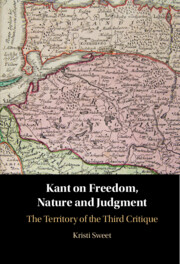Book contents
- Kant on Freedom, Nature, and Judgment
- Kant on Freedom, Nature, and Judgment
- Copyright page
- Dedication
- Epigraph
- Contents
- Acknowledgments
- Abbreviations
- Introduction
- 1 Reason, Hope, and Territory
- 2 Reflection, Purposiveness, Metaphysics
- 3 “Life” and the Ideal of Beauty
- 4 The Sensus Communis and the Ground of the Critical System
- 5 Genius, Aesthetic Ideas, and a Spiritualized Natural Order
- 6 The Domain of Nature as System: Ends
- 7 Hope and Faith: God in the Critique of Teleological Judgment
- Conclusion
- Bibliography
- Index
4 - The Sensus Communis and the Ground of the Critical System
Published online by Cambridge University Press: 07 August 2023
- Kant on Freedom, Nature, and Judgment
- Kant on Freedom, Nature, and Judgment
- Copyright page
- Dedication
- Epigraph
- Contents
- Acknowledgments
- Abbreviations
- Introduction
- 1 Reason, Hope, and Territory
- 2 Reflection, Purposiveness, Metaphysics
- 3 “Life” and the Ideal of Beauty
- 4 The Sensus Communis and the Ground of the Critical System
- 5 Genius, Aesthetic Ideas, and a Spiritualized Natural Order
- 6 The Domain of Nature as System: Ends
- 7 Hope and Faith: God in the Critique of Teleological Judgment
- Conclusion
- Bibliography
- Index
Summary
Chapter 4 argues that the sensus communis forms the keystone of Kant’s critical system. Kant develops his idea of the sensus communis as a response to the quid juris of the judgment of taste – by what right may I claim that this is beautiful? As a judgment made out in the territory, without a law, a judgment of taste is always in question. Kant’s development of the sensus communis is shown to rely on two senses of its historical usage, epistemological and social. Both of these uses of the term are developed in response to skepticism. Kant’s own use of the term, which refers to a sense that we can communicate with all other human beings, discloses to us that all human beings share a way of having the world, and, too, that we share a world in common. It thus grounds the universal character of both cognition and moral life.
- Type
- Chapter
- Information
- Kant on Freedom, Nature, and JudgmentThe Territory of the Third <i>Critique</i>, pp. 104 - 130Publisher: Cambridge University PressPrint publication year: 2023

